February 5, 2020
A Community of Support for Interfaith Ministry Leaders


What do two Christian pastors and two Muslim sheiks have in common?
It’s not a joke, but a question that ministry leaders from North America recently asked as they joined Resonate Global Mission on a trip to the Middle East. As part of the Peer to Peer Interfaith Network, ministry leaders like Jordan Palladino learned how they can better share the gospel with people from a variety of cultures and faiths.
Jordan Palladino serves as a campus pastor with International Campus Ministry, a Resonate partner at Western Michigan University that’s focused on reaching the more than 1,500 international students on campus.
“I have met students who come from all over the world and from many different faiths,” said Palladino. “I think it’s such a blessing to be part of sharing Christ’s love with international students and sharing God’s Word to all nations … there’s such an amazing opportunity to do that here.”
But that doesn’t mean it’s easy.
“We’re trying to minister to people from a variety of backgrounds, cultures, languages, and faiths. There are a lot of differences, a lot of different cultural bridges to kind of figure out how to navigate,” said Palladino.
That’s why he joined the Peer to Peer Interfaith Network, a Resonate initiative that brings together leaders from the Christian Reformed Church in North America and the Reformed Church in America. The network provides leaders with opportunities to learn about interfaith ministry, with a particular emphasis on Islam.
Participants who join Peer to Peer kick off their experience by going on a 10-day international trip to visit Resonate missionaries and ministry partners working in a Muslim-majority context.
“Our ministry sites (that Peer to Peer participants visit) involve people who have been doing interfaith ministry in challenging settings for a number of years,” said Greg Sinclair, Resonate’s interfaith ministry leader who facilitates Peer to Peer. “It is good for us in North America to not only learn about these ministries in the Middle East and see interfaith modeled by religious leaders, but to also bring them to our local communities.”
Palladino said he was eager to experience the culture in the Middle East. “A lot of the students I connect with are from the Middle East,” he said. “I can learn a little about their culture by talking to them, but it’s completely different being in their element. It gives me an extra point of contact—another starting point—for developing friendships with students.”
Palladino noted that, for all the challenges that come from navigating the differences between faiths and cultures, visiting ministry in the Middle East highlighted the similarities among all people. For him, one of the most powerful moments from the trip was engaging in scriptural reasoning with two Christian pastors and two Muslim sheiks.
“The conversation was great, but it was really amazing to see the respect and love for one another,” said Palladino. “They fundamentally disagree on matters of faith, but that didn’t stop them from engaging in dialogue, sharing meals together, and being friends.”
That same friendship and hospitality is an important part of Palladino’s ministry on Western Michigan University’s campus. The campus partners with local churches to host free lunches for international students—lunches that feed around 250 students each week. Palladino and his colleagues meet with students for coffee, grab lunch with them, and invite them into their homes.
“I got a strong sense that the way we've been doing ministry on campus is good,” said Palladino. “That interfaith work is good. That respect is good. That hospitality and loving your neighbor, regardless of knowing whether they’re going to end up believing someday, is important and valuable work.”
He said he got reassurance from his trip to the Middle East, and that reassurance is energizing. “As I return home, I not only come back with a greater understanding of Islam and of Arab and Middle Eastern culture, I am also coming back with the confidence to engage with my Muslim brothers and sisters knowing that we can both have love and respect for one another.”
As Palladino returns home, he also returns with a community of support. He’ll continue meeting with his Peer to Peer cohort by video call, where they’ll continue to share experiences and bounce ideas off one another for ministry.
“When Jesus sent people out to do ministry, he never sent them out alone,” said Palladino. “Having a group of people that you can talk to and open up with is always powerful. That’s one thing I always tell my Christian students—find a community of believers who can support you.”
Resonate’s Peer to Peer Interfaith Network provides that community of support for ministry leaders like Palladino who are working in interfaith ministry in North America.
“I really appreciated seeing how our Resonate brothers and sisters work with the community,” said Palladino. “Their work has really deepened my belief that the work I am doing at WMU is important and we are approaching students in a good way.”
Do you work with people from a variety of cultures and faith? Joining the Peer to Peer Interfaith Network will provide you with a community of support and valuable experience to strengthen your ministry. Learn more here.
This story was originally published on crcna.org.